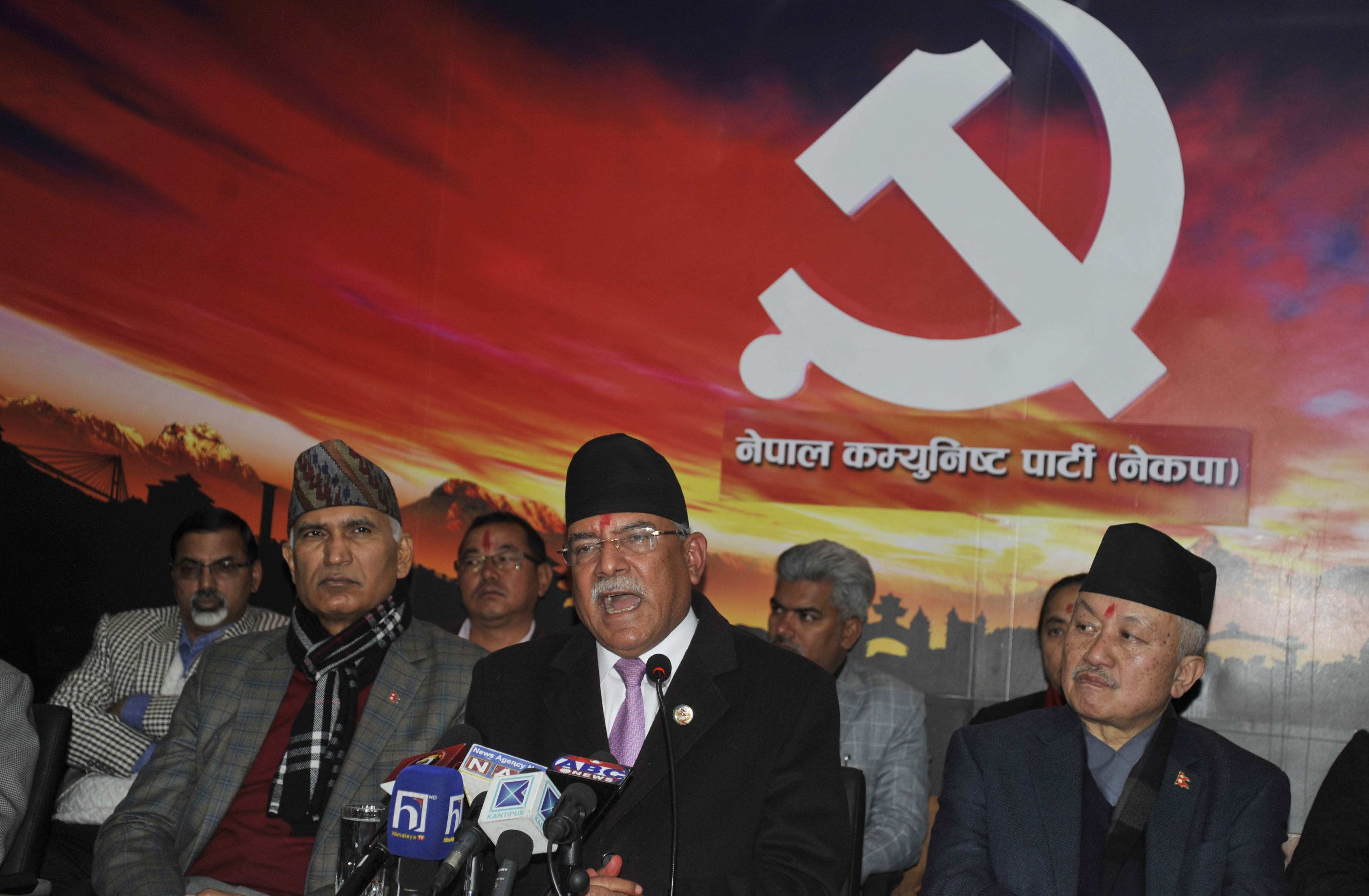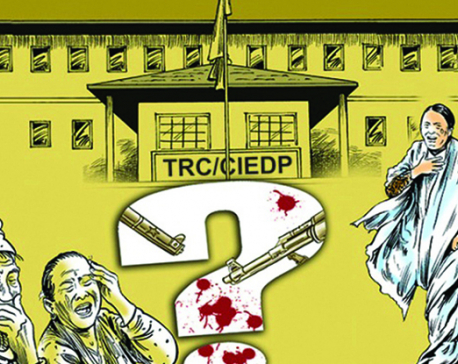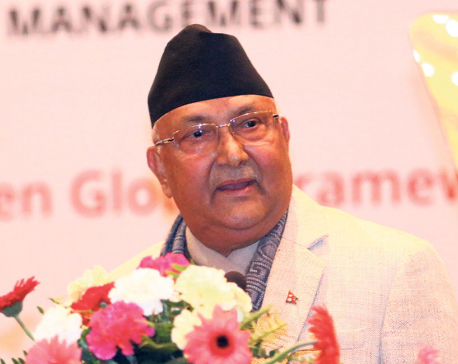
OR
Conflict victims, rights defenders, lawyers, professionals and other citizens welcome SC decision to cancel People’s War Day
Published On: January 10, 2024 02:43 PM NPT By: Republica | @RepublicaNepal

KATHMANDU, Jan 10: Victims of the decade-long armed conflict, human rights defenders, lawyers, professionals and other citizens welcomed the decision of the Supreme Court (SC) striking down the formal declaration of ‘People’s War Day’ by the Pushpa Kamal Dahal government.
This comes in the wake of the apex court on December 29 ruling that the decision of the Dahal-led government to declare a ‘People’s War Day’ goes against the letter and spirit of the Preamble of the Constitution as well as Articles 20 and 21 and 42 (5).
A statement issued jointly by 35 individuals reads, “We are clear that the armed revolt of the Maoists was not something carried out according to the call of the people of Nepal, instead it represented actions of one political party seeking to achieve its goals by striking fear among the people and misleading its own cadre with the ideology of violence. The conflict era thankfully ended when good sense prevailed on all sides, but the Government of PM Pushpa Kamal Dahal has expended much effort to give official recognition to the so-called ‘people’s war’ even though the promulgation of the Constitution itself laid rest to the nomenclature. We therefore find it entirely appropriate and necessary for the Supreme Court to have thus spoken.”
The statement further says that the significant judicial order on the ‘People’s War Day’ has also reminded us of the earlier decisions of the Supreme Court related to conflict era violence and the transitional justice process. “The series of decisions has provided protection to Nepali society and prevented the demand of conflict victims for accountability and reparation from being forgotten. The international community too has been positively impacted by the path breaking judgments on transitional justice by the highest court of Nepal, which was evident in the public pronouncements of UN Secretary-General Antonio Guterres during his recent visit to the country,” according to the statement.
The statement further reads, “A step in Nepal’s progress towards the future has been taken with the order by the Joint Bench of Justices Ananda Mohan Bhattarai and Mahesh Sharma Poudel, with the refusal to recognize the ‘People’s War Day’ announced by the Dahal Government. There is no need now for the entire society to forcibly celebrate the ‘day’. In conclusion, we denounce the political parties and political leaders who did not object to the foisting of this so-called ‘people’s war’ terminology on the people, and applaud all who relentlessly raised their voice against such an agenda.”
Those signing the statement include Suman Adhikari, Gyanendra Raj Aran, Pampha Budathoki, Kalyan Budathoki, Hira Tiwari (Sharma), Purnimaya Lama, Sabitri Shrestha, Radhika Bhattarai, Shiva Kumar Budathoki, Rita Sen, Ek Maya Bishwokarma, Hari Kumari Khadka, Manju Rawal, Shova BC, Shanker Budathoki, Bhagawati Khatiwada and Netra Bahadur Bhandari.
Ramesh Kumar Wagle, Sabitri Chiluwal, Rita Karki, Nayan Bahadur Shahi, Goila Shahi, Basmati Shahi, Krishna Gautam, Shyuam Sundar KC, Parbati Karki, Gopal Bahadur Shah, Som Niraula, Humnath Dawadi, Nitu Pokharel, Trilok Bahadur Chand, Lenin Bista, Kanak Mani Dixit, Dinesh Tripathi and Sushil Pyakurel are also among 35 individuals issuing the statement to welcome the SC’s decision.
Full Text of the Statement:
Welcoming Supreme Court’s Cancellation of ‘People’s War Day’
9 January 2024, Kathmandu
We, the undersigned victims of conflict, human rights defenders, lawyers, professionals and other citizens heartily welcome the decision by the Honourable Supreme Court striking down the formal declaration of ‘People’s War Day’ by the Pushpa Kamal Dahal Government. The judgement invalidating the Government’s declaration of a year ago was delivered by the Court on Friday, 29 December, 2023.
It needs to be clear that the armed uprising begun by the CPN (Maoist) in 1996 was aimed against the existing parliamentary system under the democratic Constitution of 1990. The Maoist leadership hoped to use violence to attain its political goals even though the road was clear to use peaceful movements and free and fair elections. The state sought to subdue the Maoist violence through its own rampant use of force, as a result of which the general public suffered for a full decade from pressure from the two warring sides. Many innocent citizens died, disappeared, were disabled, even as the property of the citizenry was looted and the rebels resorted to using child soldiers. Besides the decade of conflict, the society also had to suffer another decade of uncertainty and instability, and even today the peace process incomplete because of the delays in transitional justice.
Showing deep understanding for the era of political violence suffered by Nepali society and people, the Honourable Supreme Court has once again through its order placed some important issues before the citizenry. It will be appropriate to recall the relevant text of the most significant judicial order:
1. It is inappropriate to carry out activities that will hurt the sentiments of the petitioners, given that the requirements of the peace process are yet to be completed, that the Parliament as representative body of the sovereign people has not discussed and decided on the matter, and that the such a declaration can impact the future work of the transitional justice bodies.
2. We note that the Comprehensive Peace Accord marking the end the time of strife uses the term ‘armed conflict’ rather than ‘people’s war’. In the process of writing the Constitution of Nepal 2015, at the Constitutional Committee meeting of 25 December, 2009, the proposal to add ‘people’s war’ to the text was denied by the majority. We have to regard the Constitution prepared and promulgated by the Constituent Assembly as reflecting a nationwide consensus, which means there cannot have been societal agreement on terms that are not present in the document itself.
Thus, following the study of all relevant documents and train of events since the start of the peace process, the Honourable Supreme Court has decided that the Dahal Government’s decision to declare a ‘People’s War Day’ goes against the letter and spirit of the Preamble of the Constitution as well as Articles 20 and 21 and 42 (5). We are clear that the armed revolt of the Maoists was not something carried out according to the call of the people of Nepal, instead it represented actions of one political party seeking to achieve its goals by striking fear among the people and misleading its own cadre with the ideology of violence. The conflict era thankfully ended when good sense prevailed on all sides, but the Government of PM Pushpa Kamal Dahal has expended much effort to give official recognition to the so-called ‘people’s war’ even though the promulgation of the Constitution itself laid rest to the nomenclature. We therefore find it entirely appropriate and necessary for the Honourable Supreme Court to have thus spoken.
The declaration of the said ‘day’ on 12 February 2023 aroused great concern among us signatories, because it would energise those who wanted to use the politics of violence in the future, whereas only peaceful movements and transformation are acceptable in a democratic society protected with human rights values. Thus, it was important that the ‘People’s War Day’ declaration be struck down, to dissuade those attracted to violent politics. Neither can we forget at this juncture that non-recurrence of violence is an important pillar of the transitional justice process, the other pillars being conflict victim centricism, justice and reparation.
The significant judicial order on the ‘People’s War Day’ has also reminded us of the earlier decisions of the Honourable Supreme Court related to conflict era violence and the transitional justice process. The series of decisions has provided protection to Nepali society and prevented the demand of conflict victims for accountability and reparation from being forgotten. The international community too has been positively impacted by the pathbreaking judgements on transitional justice by the highest court of Nepal, which was evident in the public pronouncements of UN Secretary-General Antonio Guterres during his recent visit to the country.
A step in Nepal’s progress towards the future has been taken with the order by the Joint Bench of Justices Ananda Mohan Bhattarai and Mahesh Sharma Poudel, with the refusal to recognise the ‘People War Day’ announced by the Dahal Government. There is no need now for the entire society to forcibly celebrate the ‘day’. In conclusion, we denounce the political parties and political leaders who did not object to the foisting of this so-called ‘people’s war’ terminology on the people, and applaud all who relentlessly raised their voice against such an agenda.
(Translated from the original Nepali.)
Signatories:
1. Suman Adhikari, 2. Gyanendra Raj Aran, 3. Pampha Budathoki, 4. Kalyan Budathoki, 4. Hira Tiwari (Sharma), 6. Purnimaya Lama, 7. Sabitri Shrestha, 8. Radhika Bhattarai, 9. Shiva Kumar Budathoki, 10. Rita Sen, 11. Ek Maya Bishwokarma, 12. Hari Kumari Khadka, 13. Manju Rawal, 14. Shova BC, 15. Shanker Budathoki, 16. Bhagawati Khatiwada, 17. Netra Bahadur Bhandari, 18, Ramesh Kumar Wagle, 19, Sabitri Chiluwal, 20, Rita Karki, 21. Nayan Bahadur Shahi, 22. Goila Shahi, 23. Basmati Shahi, 24. Krishna Gautam, 25. Shyuam Sundar KC, 26. Parbati Karki, 27. Gopal Bahadur Shah, 28. Som Niraula, 29. Humnath Dawadi, 30. Nitu Pokharel, 31. Trilok Bahadur Chand, 32. Lenin Bista, 33. Kanak Mani Dixit, 34. Dinesh Tripathi, 35. Sushil Pyakurel.
You May Like This

Four int'l HR bodies urge govt to immediately amend TJ law in line with Supreme Court ruling
KATHMANDU, May 1: The decision by the Supreme Court to reject a petition by the government asking that it review... Read More...

Oli to attend ‘People’s War Day’ event for first time
KATHMANDU, Feb 13: Prime Minister KP Oli who skipped an annual commemoration function of the Maoist People’s War Day last... Read More...










Just In
- NRB introduces cautiously flexible measures to address ongoing slowdown in various economic sectors
- Forced Covid-19 cremations: is it too late for redemption?
- NRB to provide collateral-free loans to foreign employment seekers
- NEB to publish Grade 12 results next week
- Body handover begins; Relatives remain dissatisfied with insurance, compensation amount
- NC defers its plan to join Koshi govt
- NRB to review microfinance loan interest rate
- 134 dead in floods and landslides since onset of monsoon this year








Leave A Comment